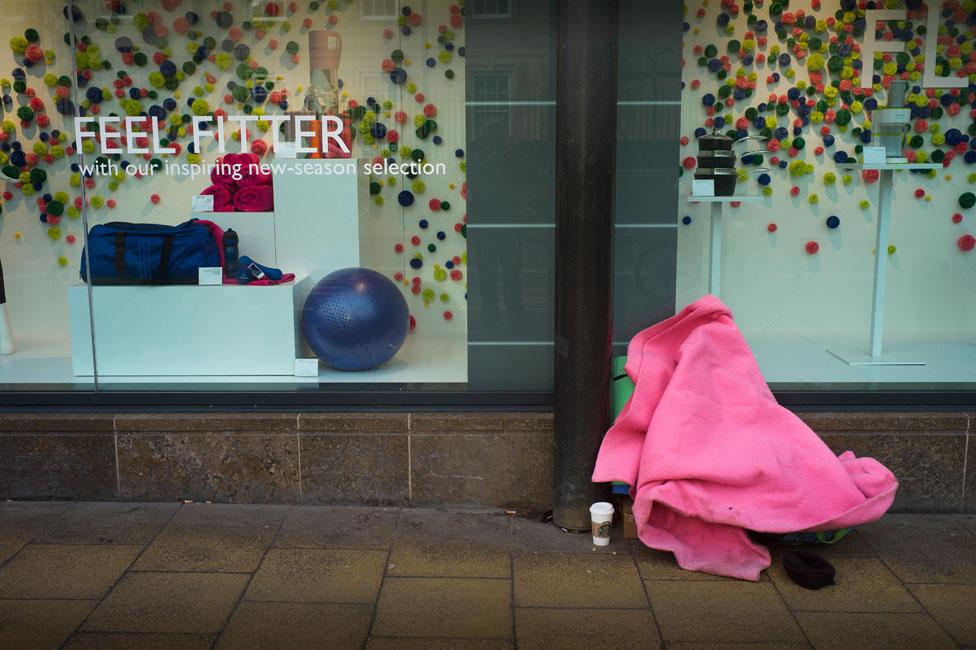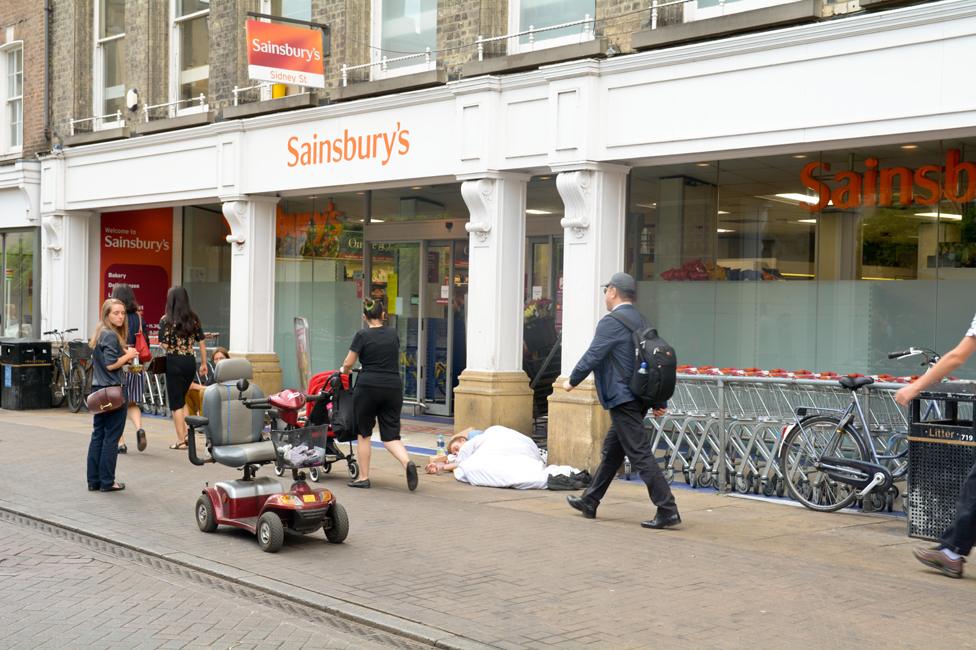Beg, get arrested, go to court, repeat...
- Published

Luke, in his mid-30s, has been homeless for years. He has been arrested 17 times for begging in Cambridge city centre but says the available shelters and hostels aggravate his mental health problems, so he stays on the street. The city's police, however, patiently re-arrest him at regular intervals.
"Sleeping rough is something you just get used to," says Luke. He has been homeless on and off since the age of 16.
Most days are spent begging outside Waitrose on one of Cambridge's main shopping streets. Passers-by avert their eyes and rush past, but a few drop coins in his cup or offer to buy him a sandwich or a drink.
Later, he will find a doorway and settle down to sleep for the night. But he knows he could be arrested at any moment.
So far he has been arrested for begging 17 times and sent to prison twice.
"I don't think it's fair really," he says.
"I don't see as I'm doing anything wrong. I don't force anyone - it's people's choice to give me money.
"They're basically putting me in prison for begging, so what am I going to do? Start shoplifting and stuff like that which they can lock me up for?"
Luke's sign reads: "Please can you help me raise £25 for a bed for the night, thanks God bless."
But he admits that he probably wouldn't spend all the money he gets on accommodation.
"I am fighting a drug issue," he says.
"Most of it probably doesn't go on a bed. But if I had 'please give me money for drugs' on the sign, who's going to give me money?"
Luke feels there is a double standard. While many people with homes and jobs have drug and alcohol problems society doesn't judge them as harshly as it judges those on the street.
The man whose job it is to arrest him is Sgt Kevin Misik, who runs the Cambridge city centre local policing team.
He says beggars make people feel uncomfortable and many complain that they can't use cashpoints when homeless people are hanging around expectantly.
"This is about everybody else who uses the city," he says. "When people like Luke do things that society as a whole do not deem to be appropriate then I cannot allow that to carry on."
But he also says lots of addicts in Cambridge use begging to fund their habits and he believes he can use the law to help snap them out of that cycle.
"The point of the work we do is to make their lives uncomfortable so the choice of accepting help is the better choice."

Find out more
Listen to The Truth About Britain's Beggars at 20:00 on Tuesday 28 August, on BBC Radio 4

The police rely on the 1824 Vagrancy Act, which allows them to prosecute anyone asking the public for money on the streets.
"The legislation is very old," admits Misik. "It was brought in just after the Napoleonic wars to stop soldiers coming back with only one leg and going, 'Look at poor me, I can't work so please give me some money,'" he says. "But in some respects it's still relevant."
Once Luke has been arrested, a court can impose a fine, a Public Service Protection Order (PSPO) or Criminal Behaviour Order (CBO).
PSPOs and CBOs ban a person from doing all kinds of things - including sitting down on the pavement or sleeping rough in the town centre. Breaching these orders can result in a prison term.
The futility of imposing a fine on someone without any money is not lost on Kevin Misik.
"I admit there's a level of irony in that they're going to have to go and beg to pay the fine," he says.

Arresting the homeless
As Home Secretary, Theresa May introduced PSPOs in 2014 to combat anti-social behaviour - later her successor, Amber Rudd, warned councils not to misuse PSPOs to clear homeless people out of city centres
Since 2014, at least 51 people are reported to have been convicted in the UK of breaching PSPOs for begging or loitering and failing to pay fines up to £1,100
In Brighton last year more than 30,000 people signed a petition calling on police to stop arresting beggars - critics questioned a system that saw beggars fined hundreds of pounds, only for them to return to the streets

Local authorities and most big homeless organisations recommend the public avoid giving to beggars.
A national campaign entitled Killing with Kindness has been rolled out in several parts of England, warning people that if they give to a beggar they could be inadvertently helping them to overdose.
But when Pope Francis was asked in an interview last year whether it is right to give to a beggar if you suspect they may spend the money on alcohol or drugs, he said it was a common excuse to pass the responsibility for those in need on to someone else.
Instead he encouraged people to give, saying that if drinking "is the only happiness he has in life, that's OK. Instead, ask yourself what do you do on the sly? What 'happiness' do you seek in secret?"

Homelessness in England has increased by 169% since 2010 and is now at a record high
Many people who run smaller charities and hostels say that giving directly can help addicts avoid committing crime to fund their habit.
"Do I give to beggars? Yes," says Danny Crowley, Manager of the Leonard Stocks shelter in Torquay, "If they're sat in a doorway, cap in hand, they're probably not out there committing crime."
For Luke the solution is not just to make use of Cambridge's services for homeless people, as the police would like him to.
He says his depression and anxiety prevent him from visiting homeless day centres and shelters, where other clients can sometimes be aggressive.
In the past he has been given accommodation, but people who have spent a lot of time on the streets often find the new responsibilities of paying bills too difficult to manage.
"It's a vicious circle," he says. "Sometimes you get everything sorted out and then the littlest thing happens and you lose your place and you're back to square one again."
So despite all the arrests and all the court orders imposed on him Luke continues to beg openly in the city centre. He says he's not particularly worried about being arrested again.
"The consequences are jail - which means three square meals a day and a place to sleep."
Update: Luke was interviewed in July. Sgt Misik says he is no longer in Cambridge
Join the conversation - find us on Facebook, external, Instagram, external, YouTube, external and Twitter, external.
